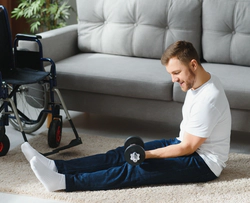New Findings Show Exercise Can Help Recovering Addicts Live Better Lives
Yet another body of research has affirmed that physical exercise is beneficial in helping to recover addicts and build strength in their sobriety. Further, there are exercises that all recovering addicts, no matter their health condition, can take part in.

Recovery from drug and alcohol addiction is a lifelong commitment because overcoming addiction takes time and energy. While much of the work can be done over a relatively short period thanks to the help of qualified residential drug rehab centers, staying off drugs and alcohol and building a sober life that is fulfilling, productive, meaningful, and drug-free is a journey that a recovering addict must work at daily.
What the Latest Findings Show
A group of researchers examined 43 studies worldwide that examined the effects of regular exercise on recovering addicts. The conclusions from the 43 studies, which the researchers published in the Public Library of Science, showed a clear link between regular physical activity and reduced substance use, relapse, and overdose among people recovering from drug and alcohol addiction.1
The researchers examined reports for just over 3,100 recovering addicts, noting that even just “moderately intense” exercise, done for about one hour three times per week over three months, was associated with a higher likelihood of sobriety and relapse-free living. The recovering addicts studied had formerly been addicted to various drugs, including heroin, opioids, cocaine, crack cocaine, methadone, marijuana, alcohol, and methamphetamine.
According to study author Florence Piche, a doctoral candidate in sciences and physical activity at the University of Quebec in Trois-Rivières and the University of Montreal, Canada, 75% of the 43 studies examined showed that substance abuse fell in connection with physical activity. Fourteen studies solely examined aerobic activities, and ten showed aerobic exercise helps people maintain their resolve to cut back or quit using mind-altering substances. Finally, 12 studies also reported a link between exercise and reduced depression-related symptoms (depression-related symptoms are often a predictor of relapse and a resumption of regular drug and alcohol abuse).
How does exercise affect a recovering addict’s resolve to stay sober? Connie Diekman, a food and nutrition consultant and a former Academy of Nutrition & Dietetics resident, sought to answer that question. “Participating in physical activity does increase people’s goals to be healthy. It can also generate a ‘euphoric’-type feeling. And it provides some structure to our daily lives. All things that can help us feel more in control of emotions and any need for substances to manage daily life issues,” she said. “The overall conclusion was that exercise does appear to have a significant protective effect when it comes to reducing substance use among patients struggling with substance use disorders.” While it is true that individuals experience recovery differently, it seems that all recovering addicts can likely benefit from exercise.2
Exercise for All
A concern voiced by some in recovery is that they want to exercise but are unsure if they can due to physical limitations. Thankfully, the movement to inspire accessibility in exercise has produced several types of physical activities that can provide recovering addicts with the benefits of exercise, even with their mobility limitations. A few examples include:3
- Cardiovascular exercises. People with limited mobility can benefit from “aqua jogging” or exercising in an exercise pool. Many people with mobility issues, even those in a wheelchair, find exercising in water especially beneficial as it supports the body and reduces the risk of muscle or joint discomfort and unnecessary strain.

-
Strength training. People with isolated injuries, a bad back, hip injuries, or limited mobility can still improve their health with strength training. They should focus on the areas of their body they can move without discomfort.
-
Flexibility exercises. Flexibility can enhance one’s range of motion, prevent injury, reduce pain, and alleviate stiffness. Even those with limited mobility can still perform simple stretch exercises while seated, lying down, or supported by another person.
Finally, exercise provides more to recovering addicts than a physical benefit. Dr. Claire Twark writes that exercise’s social, behavioral, and psychological aspects may also account for the benefits recovering addicts experience when they exercise regularly. “In my experience, many patients with various substance use disorders have found that exercise helps to distract them from cravings,” says Dr. Twark. “Workouts add structure to the day. They help with forming positive social connections, and help treat depression and anxiety in combination with other therapies.” Truly, there are many benefits to exercising, some of which are not readily apparent but are still working their magic on the mind and spirit of the recovering addict.4
Addiction Treatment First, Then Exercise
The research continues to show how exercise produces immense benefits to recovering addicts by improving their physical health, boosting their self-esteem and mental space, curbing other bad habits, and providing a “natural high” in the form of an endorphin release.
However, exercise can only work wonders on recovering addicts after they get off drugs and alcohol once and for all. Exercise is a useful tool for improving recovering addicts’ health and helping them stay sober, but exercise alone cannot make an addict stop drinking or using drugs. That’s why addicts must seek treatment first and adopt an exercise regimen once they’ve completed rehab.
Sources:
-
PLOS. “Characteristics and impact of physical activity interventions during substance use disorder treatment excluding tobacco: A systematic review.” The Public Library of Science, 2023. journals.plos.org ↩︎
-
USNews. “Exercise Could Be an Antidote to Addiction, Data Suggests.” U.S. News, 2023. usnews.com ↩︎
-
HHP. “Can exercise help conquer addiction?” Harvard Health Publishing, 2018. health.harvard.edu ↩︎
-
HG. “Limited mobility doesn’t mean you can’t exercise.” Help Guide, 2023. helpguide.org ↩︎




 ®
®